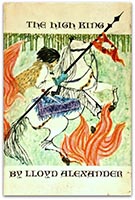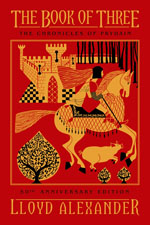The bard did not answer. For a long moment he held the harp lovingly in his hands and gently touched the strings, then with a quick motion raised the beautiful instrument and smashed it across his knee.
Taran cried out in anguish as the wood shattered into splinters and the harp strings tore loose with a discordant burst of sound. Fflewddur let the broken fragments drop from his hands.
“Burn it,” he said. “It is wood well-seasoned.”
Fflewddur’s harp
The Tao of Prydain
Prydain, of course, is just the Welsh name for Britain; you can find it now on any U.K. passport, though Lloyd Alexander did not live to see that. Thanks to Mr. Alexander, the name has acquired a second meaning: it is also the name of a Secondary World, a parish or precinct of Faërie, which serves as the setting for one of the founding texts of modern fantasy. The Book of Three has, I am told, never been out of print since its appearance almost fifty years ago. This fact alone is enough to make many a modern fantasy writer weep with envy. One could, I suspect, fill a very large bookcase with the fantasy trilogies of which Book One was already out of print by the time Book Three appeared. But Prydain remains, partly because the publishers of children’s books are not afraid of their own shadows, and are not too proud to take the profits of a hardy perennial.
My own acquaintance with the fictional Prydain began when I was ten, and read all five of the original books out of the school library; a couple of years later, I acquired my own copies, which went missing in a house-move many years later. Last year, during the enforced idleness that followed upon my fall down stairs, I was delighted to find a complete set of the paperbacks, no longer virginal but still alluring, on a sky-high shelf at a second-hand bookshop within bowshot of my current home. I adopted them and took them home, and packed my bags for a visit to Prydain, to see if the tales retained their charm for an older and more jaded reader, or if they belonged in the vast category of trash that I only enjoyed because I had not yet learnt to tell my good taste from my bad.
I am pleased to report that the books seem as good as they ever did to me, or better. I understand, now, how Alexander produced some of his effects, and where he got some of the odder ingredients for his confection. I still like the same bits I liked as a boy of ten, and dislike most of the bits that left me cold then; but now I can appreciate the ingenuity of the good parts, and at any rate account for the others. I read the books this time with a curious sort of double vision — one eye in childhood, the other in decrepitude, with a lifetime of parallax between them. This gives me a perspective and depth of field, as it were, that would be hard to get in any other way. [Read more…]
The myth of autarky
Personally I believe that most people are influenced far more than they would care to admit by novels, serial stories, films and so forth, and that from this point of view the worst books are often the most important, because they are usually the ones that are read earliest in life.
—George Orwell, ‘Boys’ Weeklies’
Fantasyland, as the late Diana Wynne Jones showed in her seminal Tough Guide thereto, is an irksome place. It irks me, at any rate, because it is not a world but something more like a film-set; it does not have the working parts to do what it pretends to do. Tolkien was confessedly ignorant of economics, but he at least tried to make sure (for instance) that the Shire was in a naturally fertile clime that could support a large population of hungry hobbits, and that the ‘townlands’ surrounding Minas Tirith were adequate to feed the people of the city. He even threw in a sentence or two about slave plantations in the South of Mordor, around the Sea of Núrnen, to show how Sauron supplied his horde of evil minions. Many fantasy writers don’t even take that much trouble.
Whenever I read about a Glorious Imperial City of Gold™ on top of a high mountain, or a Decadent Palace of the Evil Sultan™ in the midst of a trackless desert, I always find myself asking: ‘But what do these people live on?’ A writer could, by mere fiat, say that they get their food by magic; yet the magic is never there. Not only do we not see it onstage, we also do not see any of the probable consequences and (as fools and mortals say) ‘side-effects’ that such magic would have on all other areas of life. One day I shall probably write a snarky and contumacious tract on the economics of Faërie, but for now I want to leave most of that subject on one side and tackle one particular issue. That is the attitude of almost religious awe that fantasy writers have for societies based on subsistence agriculture — an attitude that, in my wide experience, only occurs among people who know nothing about agriculture and precious little about subsistence.
This attitude is not only prevalent in fantasy; some people hold it in real life as well. Among these we must number the ‘locavores’, the well-meaning fools who think it somehow unethical to eat any food grown more than, say, 100 miles away. This is nonense, and easily proved to be nonsense; but a hundred proofs are not worth as much as one plausible story. That is why it is so dangerous that so many of our storytellers don’t know the facts of the case and do not seem interested in learning them. People, consciously or not, are forming their views of life from stories that are not based on life at all.
I hope you will bear with me, then, while I tell a little story, and if it is not a hundred-proof story, I hope it may be strong enough drink for the occasion. And if it is drink that we want, I had better put wine in the story, since wine is the drink of the storyteller, except in those far Northern climes where the skalds sing in mead-halls. I have simplified the details, but everything I say about the simple diet of Eucharia applies to our own more complex society as well. [Read more…]









Recent Comments